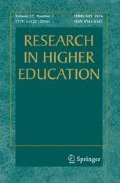Abstract
This study, based on the theoretical model of Teacher Self-Efficacy proposed by Denham and Michael (1981), explored the effects of prior training, previous teaching experience, and certain demographic variables on the teaching self-efficacy of graduate teaching assistants. An adapted version of the Self-Efficacy Toward Teaching Inventory (Tollerud, 1990) was administered to a sample of graduate teaching assistants. Graduate teaching assistants with prior training endorsed a significantly higher level of self-efficacy than those with no training. Correlational analyses demonstrated significant positive relationships between prior training and previous teaching experience with level of self-efficacy. Multiple regression analysis indicated that previous teaching experience explained a significant amount of variance in self-efficacy. Results are discussed in light of the current training and utilization of graduate teaching assistants, and suggestions for future research are offered.
Similar content being viewed by others
References
Abbott, R., Wulff, D., and Szego, K. (1989). Review of research on TA training. In J. Nyquist, R. Abbott, and D. Wulff (eds.),Teaching Assistant Training in the 1990s: Number 39. New Directions for Teaching and Learning (pp. 111–124). San Francisco, CA: Jossey-Bass.
Allen, R., and Rueter, T. (1990).Teaching Assistant Strategies: An Introduction to College Teaching. Dubuque, IA: Kendall/Hunt Publishing Co.
Armor, D., Conroy-Osequera, P., Cox, M., King, N., McDonnell, L., Pascal, A., Pauly, E., and Zellman, G. (1976).Analysis of the Preferred School Reading Programs in Selected Los Angeles Minority Schools (Report 2007). Santa Monica, CA: Rand Corporation.
Bandura, A. (1977). Self-efficacy: Toward a unifying theory of behavioral change.Psychological Review 84(2): 191–215.
Bandura, A. (1978). Reflections on self-efficacy.Advances in Behavioral Research and Therapy 1: 139–161.
Bandura, A. (1982). Self-efficacy mechanisms in human agency.American Psychologist 37(2): 122–147.
Berman, P., and McLaughlin, M. (1977).Federal Programs Supporting Educational Change: Factors Affecting Implementation and Continuation (Report 1589). Santa Monica, CA: Rand Corporation.
Braskamp, L., Caulley, D., and Costin, F. (1979). Student ratings and instructor selfratings and their relationship to student achievement ratings.American Educational Research Journal 16(3): 295–306.
Bray, J., and Howard, G. (1980). Methodological considerations in the evaluation of a teacher-training program.Journal of Educational Psvchology 72(1): 62–70.
Brophy, J. (1979). Teacher behavior and its effects.Journal of Educational Psvchology 71(6): 735–750.
Carrol, J. (1977). Assessing the effectiveness of a training program for the university teaching assistants.Teaching of Psychology 4(3): 135–138.
Chism, N., Cano, J., and Pruitt, A. (1989). Teaching in a diverse environment: Knowledge and skills needed by TAs. In J. Nyquist, R. Abbott, and D. Wulff (eds.),Teaching Assistant Training in the 1990s: Number 39. New Directions for Teaching and Learning (pp. 23–36). San Francisco, CA: Jossey-Bass, Inc.
Dembo, M., and Gibson, S. (1985). Teacher's sense of efficacy: An important factor in school improvement.Elementary School Journal 86(2): 173–184.
Denham, C., and Michael, J. (1981). Teacher sense of efficacy: A definition of the construct and a model for further research.Educational Research Quarterly 6(1): 39–61.
Evans, E., and Tribble, M. (1986). Perceived teaching problems, self-efficacy, and commitment to teaching among preservice teachers.Journal of Educational Research 80(2): 81–85.
Friedlander, M., and Snyder, J. (1983). Trainees' expectations for the supervisory process: Testing a developmental model.Counselor Education and Supervision 22(4): 342–348.
Gibson, S., and Dembo, M. (1984). Teacher efficacy: A construct validation.Journal of Educational Psychology 76(4): 569–582.
Grush, J., and Costin, F. (1975). The student as consumer of the teaching process.American Educational Research Journal 12(1): 55–66.
Jackson, W., and Simpson, R. (1983). A survey of graduate teaching assistant instructional improvement programs.College Student Journal 17(3): 220–224.
Newby, W., and Katz, A. (1980). Do student ratings of graduate-level laboratory instructors predict how students like lab?Teaching of Psychology 7(2): 87–89.
Nyquist, J., Abbott, R., and Wulff, D. (1989). The challenge of TA training in the 1990s. In J. Nyquist, R. Abbott, and D. Wulff (eds.),Teaching Assistant Training in the 1990s: Number 39. New Directions for Teaching and Learning (pp. 7–14). San Francisco, CA: Jossey-Bass, Inc.
Owen, S., and Froman, R. (1988, April). Development of a college academic selfefficacy scale. Paper presented at the annual meeting of the National Council on Measurement in Education, New Orleans, LA.
Rotter, J. (1966). Generalized expectancies for internal vs. external control of reinforcement.Psychological Monographs 80: 1–28.
Sakofske, D., Michayluk, J., and Randhawa, B. (1988). Teacher's efficacy and teaching behaviors.Psychological Reports 63(2): 407–414.
Tollerud, T. (1990). The perceived self-efficacy of teaching skills of advanced doctoral students and graduates from counselor education programs (Doctoral dissertation, University of Iowa, 1990).Dissertation Abstracts International 51: 12A.
Author information
Authors and Affiliations
Additional information
is with the College of Education
Rights and permissions
About this article
Cite this article
Prieto, L.R., Altmaier, E.M. The relationship of prior training and previous teaching experience to self-efficacy among graduate teaching assistants. Res High Educ 35, 481–497 (1994). https://doi.org/10.1007/BF02496384
Received:
Issue Date:
DOI: https://doi.org/10.1007/BF02496384




